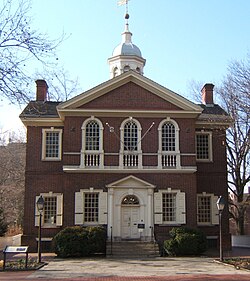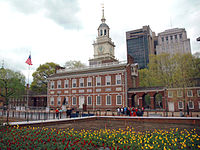
Back الكونغرس القاري الأول Arabic Birinci Kontinental Konqres Azerbaijani Беренсе Континенталь конгресс Bashkir Першы Кантынентальны Кангрэс Byelorussian Першы Кантынэнтальны кангрэс BE-X-OLD Erster Kontinentalkongress German Primer Congreso Continental Spanish نخستین کنگره قارهای Persian Ensimmäinen mannermaakongressi Finnish Premier Congrès continental French
First Continental Congress | |
|---|---|
 | |
| Type | |
| Type | |
| History | |
| Established | September 5, 1774 |
| Disbanded | October 26, 1774 |
| Preceded by | Stamp Act Congress |
| Succeeded by | Second Continental Congress |
| Leadership | |
President | |
Secretary | |
| Seats | 56 from 12 of the 13 colonies |
| Meeting place | |
 | |
| Carpenters' Hall, Philadelphia | |
| This article is part of a series on the |
| United States Continental Congress |
|---|
 |
| Predecessors |
| First Continental Congress |
| Second Continental Congress |
| Congress of the Confederation |
| Members |
| Related |
|
|
The First Continental Congress was a meeting of delegates of 12 of the Thirteen Colonies held from September 5 to October 26, 1774 at Carpenters' Hall in Philadelphia at the beginning of the American Revolution. The meeting was organized by the delegates after the British Navy implemented a blockade of Boston Harbor and the Parliament of Great Britain passed the punitive Intolerable Acts in response to the Boston Tea Party.[1]
During the opening weeks of the Congress, the delegates conducted a spirited discussion about how the colonies could collectively respond to the British government's coercive actions, and they worked to make a common cause. As a prelude to its decisions, the Congress's first action was the adoption of the Suffolk Resolves, a measure drawn up by several counties in Massachusetts that included a declaration of grievances, called for a trade boycott of British goods, and urged each colony to set up and train its own militia. A less radical plan was then proposed to create a Union of Great Britain and the Colonies, but the delegates tabled the measure and later struck it from the record of their proceedings.
The First Continental Congress agreed on a Declaration and Resolves that included the Continental Association, a proposal for an embargo on British trade. They also drew up a Petition to the King pleading for redress of their grievances and repeal of the Intolerable Acts. That appeal was unsuccessful, leading delegates from the colonies to convene the Second Continental Congress, also held in Philadelphia. the following May, shortly after the Battles of Lexington and Concord, to organize the defense of the colonies as the American Revolutionary War.
- ^ Stathis, Stephen (2014). Landmark Legislation 1774–2012: Major U.S. Acts and Treaties. Washington DC: CQ Press. pp. 1–2. doi:10.4135/9781452292281.n1. ISBN 978-1-4522-9230-4.
© MMXXIII Rich X Search. We shall prevail. All rights reserved. Rich X Search